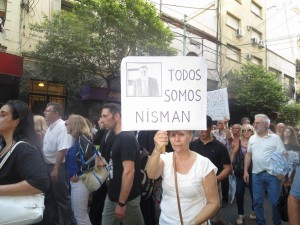Argentine President Under the Spotlight
Less than a month ago, Argentina was shocked by the death of a prosecutor who was investigating the worst terrorist attack in the country’s history. Alberto Nisman accused president Cristina Fernandez de Kirchner of covering up those responsible for the attack; however, hours before he was to show the evidence at a hearing in congress, he was found dead in his bathroom. As a result of this untimely death, president Fernandez is now under domestic and international spotlight, with everyone anxious to see how the maximum authority of the country will deal with the situation. Unfortunately, Fernandez and her cabinet have gone through blunder after blunder since Nisman’s death, affecting Fernandez’s image in her own country and abroad.

The investigation on Nisman’s death has been a real Catch-22, with many details revealed that lead nowhere. One of the first details to arise was the fact that no gunpowder residue was found on Nisman’s hand, making suicide unlikely. After that, a third, more secretive entrance to the apartment was found, containing a mysterious footprint. Despite these new revelations, the case is nowhere near being solved, and gets more convoluted every day. Fernandez’s reaction to the developing case was as bizarre as the case itself. In a first letter published briefly after Nisman’s death, Fernandez supported the suicide theory, whereas in her second letter, published some days later, Fernandez now supported the murder theory, dismissing the possibility for suicide as an uninformed conspiracy. Also missing from her letters were condolences to Nisman’s family, and an assurance to the Argentine people that justice will be served.
A week after the story broke out, Damian Pachter, an Argentine-Israeli journalist, released an article on an Israeli newspaper, revealing that he had to flee Argentina. Pachter was the first person to report on Nisman’s death, and the case brought him into the spotlight. In the coming days, Pachter felt that he was being followed, and fearing for his safety, Pachter bought a ticket to Tel Aviv. On the same day as Pachter fled the country, La Casa Rosada, the Argentinean seat of presidential power, unexpectedly tweeted Pachter’s itinerary. The tween also included his return date. Pachter’s ticket became one-way, and today he feels safer in Tel-Aviv.
Argentina was further shocked when Fernandez announced on a televised speech that she was going to reform the nation’s intelligence service. The now defunct SIDE, which was the Argentine intelligence service, became one of the major players in the Nisman case, and one of Fernandez’s biggest obstacles. The prosecutor had close ties to the SIDE and its director Jaime Stiuso, who provided Nisman with evidence for his accusation. Fernandez’s sudden announcement to dissolve the SIDE and create a new intelligence service run by appointed members was met with skepticism in Argentina.
One of the biggest stories in the case was the revelation of a 26-page document written by Nisman which ordered the arrest of Fernandez and Foreign Minister Hector Timerman. The draft was found in the garbage at the apartment, and it revealed just how serious Nisman was about his allegations. Argentine newspaper Clarin, mortal enemy of Fernandez and her cabinet, first broke the story, alluding to the existence of these documents. The Chief of the Cabinet of Ministers, Jorge Capitanich, argued on his daily press conference that the documents didn’t exist and that the Clarin article was pure conjecture—blind to metaphor—literally tore the article apart. However, when it was confirmed that the documents were in fact real, Capitanich made no comment on his mistake, and reiterated his criticisms of Clarin.
While Capitanich was tearing newspapers in Argentina, president Fernandez toured China, overseeing some trade negotiations between Argentina and the Asian giant. Impressed by the grand scale of the events, Fernandez turned to Twitter to voice her satisfaction. Unfortunately, she did so with a racist joke, mocking the Chinese accent of mixing the r’s with l’s. Fernandez’s tweet has been widely criticized in Argentina, China, and major media outlets throughout the world.
These events have contributed to a negative image of Fernandez domestically and abroad. Fernandez’s image and approval rate in Argentina has plummeted so much that the government has planned an initiative to restore her good image. With elections coming up this October, Fernandez is desperate to improve her image so that her political party, Frente Por la Victoria, will have better chances in the upcoming elections. Meanwhile, a new movement is gaining momentum in Argentina. Backed by several prosecutors and opposition, #18F will be a march of silence on February 18, one month after Nisman’s death. The Argentine people will march throughout the country, silently and peacefully demanding justice from an already debilitated government.
